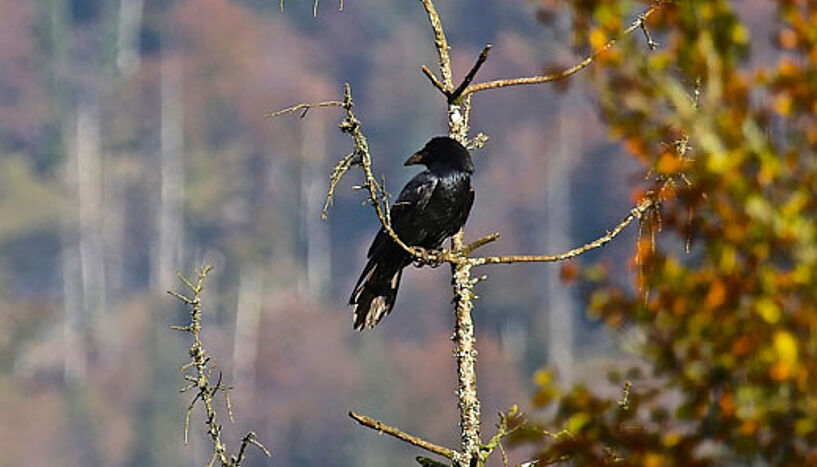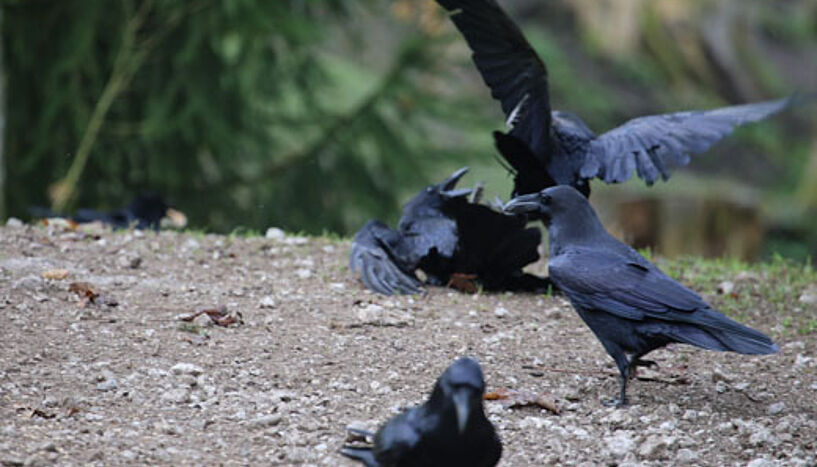"Divide and Rule" – Raven politics
29. Oktober 2014A group of ravens is sometimes called a conspiracy. Mythology and folklore have attributed many supernatural features to these large black birds. During the last decades, studies on the cognitive abilities of ravens have indeed revealed that they are exceptionally intelligent. Ravens live in complex social groups and they can gain power in these groups by building social bonds that function as alliances. Cognitive biologists of the University of Vienna and the Konrad Lorenz Research Station now revealed that ravens use a "divide and rule" strategy in dealing with the bonds of conspecifics: Socially well integrated ravens prevent others from building new alliances by breaking up their bonding attempts. The results of this study have been published in the scientific journal "Current Biology".
Thomas Bugnyar and his team have been studying the behavior of approximately 300 wild ravens in the Northern Austrian Alps for years. They observed that ravens slowly build alliances through affiliative interactions such as grooming and playing. However, they also observed that these affiliative interactions were regularly interrupted by a third individual. Although in about 50 % of the cases these interventions were successful and broke up the two affiliating ravens, intervening can be potentially risky when the two affiliating ravens team up and chase away the intervening individual.
Interestingly, the researchers found that these interventions did not occur at random. Specifically ravens that already have an alliance tend to interrupt the affiliative interactions of those individuals that are in the process of establishing one. "Because of their already established power, allied ravens can afford such risky strategies", explains lead-author Jorg Massen: "They specifically target those ravens that are about to establish a new alliance, and might thereby prevent them from becoming future competitors through a divide and rule strategy."
Massen furthermore underlines that at the time of intervention the birds that are trying to establish an alliance are no threat yet to the already allied ravens. "It thus seems that the ravens keep track of the relationships of others and have a keen understanding of when to intervene in affiliative interactions and when not; i.e. not when these are just loose flirts, but also not when the alliance is already established and it is already too late", says Jorg Massen. This is the first time that such a sophisticated political maneuver has been described in animals other than humans.
Publication in "Current Biology"
Massen, J.J.M., Szipl, G., Spreafico, M. & Bugnyar, T (2014). Ravens intervene in others’ bonding attempts. Current Biology. Published online October 30th, 2014.
DOI: http://dx.doi.org/10.1016/j.cub.2014.09.073
Scientific contact
Jorg J.M. Massen, PhD
Department of Cognitive Biology
University of Vienna
1090 Vienna, Althanstraße 14
T +43-699-1131 0182
jorg.massen(at)univie.ac.at
Press contact
Mag. Alexandra Frey
Press office, University of Vienna
Research and Teaching
1010 Vienna, Universitätsring 1
T +43-1-4277-175 33
M +43-664-602 77-175 33
alexandra.frey(at)univie.ac.at
Wissenschaftlicher Kontakt
Jorg J.M. Massen, PhD
Department für KognitionsbiologieUniversität Wien
1090 - Wien, Althanstraße 14
+43-699-1131 0182
jorg.massen@univie.ac.at
Rückfragehinweis
Mag. Alexandra Frey
Media Relations ManagerUniversität Wien
1010 - Wien, Universitätsring 1
+43-1-4277-17533
+43-664-8175675
alexandra.frey@univie.ac.at


